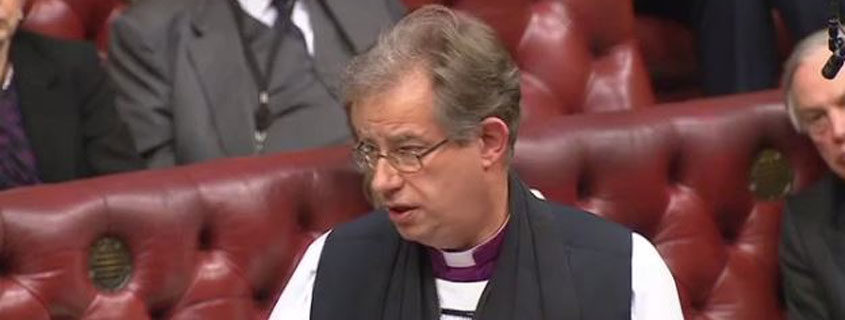The Bishop of Oxford, the Rt Revd Steven Croft, spoke in the House of Lords today on the role of education in building a flourishing and skilled society. The debate was proposed by the Lord Archbishop of Canterbury, Justin Welby.
THE Bishop of Oxford, the Rt Revd Steven Croft, has welcomed the Manifesto to Strengthen Families.
In a speech to the House of Lords on Thursday November 2nd, he said:
“My Lords I warmly welcome this report. I like it more each time I read it. It’s very modesty is its virtue. A small number of strategic changes can make an immense difference. Two points:
I commend the vision of a government focussed on supporting families.
The default in our culture is a greater focus on individuals in law and public policy.
Yet we all exist as part of diverse families and networks of relationships: a fundamental insight of Christian tradition. These families are the cornerstone of our well being and the common good.
The proposals in Section A of the report offer a necessary counterweight at the heart of government which pays attention to the deep fabric of our lives. They are more radical than they sound. Let’s do them.
Second, I applaud the encouragement to work with voluntary and private sector partners.
The task of supporting families is much too important to be left to government. But government’s role is vital in setting vision and standards, as a convenor and broker.
The charity PACT was founded by the Diocese of Oxford in 1911. PACT exists to build and strengthen families.
Last year, as part of PACTs work we placed 87 adopted children in families and approved 49 families to adopt. Each extra family approved to adopt adds over £1.1 million in value to society.
2 years ago Oxfordshire County Council had to cut its funding to its 43 Children’s Centres. All but 8 were in danger which would have been an immense loss to local communities. The Council worked with the churches and voluntary sector. There has been a tremendous response. Thanks to the power of working with, 38 will remain open.
Funding to these ventures can be modest but it needs to be consistent. The staccato cycle of new funding followed by funding cuts, new initiatives starting then ending prematurely halts improving outcomes for the very families we seek to support.
My Lords I welcome this report: the new focus, the working with, the modesty and the chance for a new beginning. I hope sincerely the government will find the courage to take this manifesto forward.”
Watch Bishop Steven speaking in the House of Lords
Follow Bishop Steven on Facebook
In case anyone might be wondering what bishops do in the House of Lords, here’s a summary of my week.
I was then “duty bishop” from 5-10 March 2017. We each do a couple of weeks of duty a year and then serve as we can in various ways.
Our first task at the beginning of each session is lead prayers for the House: always well attended and taken seriously.
Monday My aim is to get my head round the week ahead. I’m asked to monitor and follow the debates on the Committee stage of the Higher Education and Research bill. This is a major bill aiming to raise the quality of teaching in Universities. I speak to an amendment about protecting the rights of disabled students and vote (against the Government) in two divisions. The key role of the Lords is improving legislation sent on by the House of Commons and the Lords Spiritual play their part in that process. The Bishop of Worcester speaks in a short evening debate on assisted dying.
Tuesday Brexit day. The chamber is packed with a record number of peers (and bishops). The debates are on amendments to the bill to trigger Article 50 and begin the process of leaving the European Union. A day of high emotion and big speeches by great Parliamentarians. The best came from Lords Hailsham and Heseltine. A notable speech from the Archbishop of Canterbury. I vote with the Government on the first main amendment (for a second referendum) but against the Government on a second (to write into the bill the requirement to come back to Parliament).
Each Lords session also has four questions to ministers. I try to ask a supplementary but failed. Someone came in first on exactly the same issue.
Wednesday looks quieter. We’re back to scrutinising and improving the HE bill. At short notice, I’m asked to speak to an amendment to safeguard the Archbishop of Canterbury’s degree awarding powers. It carries. More divisions (or votes) on the HE bill and a long and vigorous debate on the Teaching Excellence Framework. The budget is happening in another place, just along the corridor but hardly gets a mention.
Thursday Another opportunity to ask a supplementary. This time I have three prepared. The question was on Universal Credit and hardship caused by delays in welfare payments. The Bishop of Coventry has a question on Iraq.
The main business of the day is the second reading of the Criminal Finances Bill. This is a wide ranging bill with all party support aimed at preventing the financing of terrorism, tax fraud and grand corruption in or through the United Kingdom. I speak in the debate, supported by Christian Aid, to encourage the government to aim even higher in battling tax evasion through public registers of beneficial ownership. No votes today.
Friday The House approves the second reading of a private members bill to reduce homelessness. The Bishop of St Albans speaks in an important short debate on Preventing and Combating Violence against Women.
All in all a fascinating week (and different from my normal routines). There is some follow up to do: a letter to the minister about his answer to my question on Universal Credit and some possible amendments to the Criminal Finances bill. I won’t be there for the ping pong with the Commons on Brexit.
The baton passes to the Bishop of Chester on Monday . . .
My Lords,
May I from these benches warmly welcome the Sustainable Development Goals and the government’s commitment to them.
Like others I was initially somewhat sceptical about a document which contains 17 goals and 169 targets. These are not even memorable or round numbers. I have to say, however, I am inspired by the single vision for our world which drives and shapes these goals. That vision is set out in the ambitious declaration which forms the preface to the draft document to be considered and I hope agreed at the September summit.
The language of the declaration is lofty and rightly so. I quote: “Never before have world leaders pledged common action and endeavour across such a broad and universal policy agenda”. And again, “We can be the first generation to succeed in ending poverty just as we may be the last to have a chance of saving the planet”.
The vision in this document of sustainable development, a safer world with more resilient institutions where no-one is left behind is one that is consistent with the Christian tradition and those of the major world faiths. I applaud it, believe it and support it.
However it is a vision which needs to be communicated well and implemented with rigour and it is here I want to focus my remarks.
The single vision is broken down in the report into just five areas of critical importance. These five areas are easy to name, to remember and to communicate: People, planet, prosperity, peace and partnership. Preachers love alliteration.
I would encourage the government to place real weight on these shorter, more memorable and more accessible headings, for this reason. These visionary goals for our world will only be realised as they are widely understood and communicated. This vision will never be realised if it is the vision only of politicians and NGO’s. It must become the vision of all the majority of people on the planet, a shared vision of prosperity, peace and partnership. The goals need to be spoken of in schools and universities and in the media. There needs to be international debate. Resources need to be invested here and elsewhere in education and building awareness of the values which underpin this vision which are no longer self evident in our society or across the world.
My Lords I was a member a few years ago of the city wide fairness commission in Sheffield. I assumed at the beginning of the process, that fairness would be a shared concept among the population, that we were articulating a common vision. On the day of the report’s publication I appeared on local radio. The phone in responses revealed that my assumption was wide of the mark. A big vision and detailed targets are both excellent but in between comes the harder task of transforming human attitudes and building deeper generosity of spirit: explaining the reasons why we seek a better world for all. The churches and faith communities have a key role here. We understand we are global citizens. We share the deeper values which lie beneath these goals.
To quote from the report again: “…we are setting out a supremely ambitious and transformational vision. We envisage a world free of poverty, hunger, disease, and want where all life can thrive….a world in which every woman and girl enjoys full gender equality….a just, equitable, tolerant, open and socially inclusive world in which the needs of the most vulnerable are met….a world in which consumption and production patterns are sustainable”.
This vision is worthy of agreement and it is worth sharing and communicating throughout our nation and beyond it. I hope the government will take this responsibility seriously.
It is also a vision which calls for clear plans for implementation. Here I would encourage the government to pay careful attention to the plans for enacting this ambitious programme and for scrutiny and review.
May I therefore ask the Minister two specific questions:
Will the government commit to promoting the vision of the SDGs and to implement the agenda in this country in full. If so how do you plan to do this?
How will the government use the high level summit to build support for an ambitious global climate change agreement in Paris in November and December. If so what link does the minister see between the two summits?
We all listen more to those who practise what they preach. The government’s rhetoric on climate change in the manifesto for the election was good. The government’s record on climate change since the election is a cause of concern to many, myself included.
The independent Climate Change Committee have already raised the issue of a gap between the policies already in place and the policies needed to meet the climate change the government supports.
Many were therefore expecting a series of positive policy announcements to close this gap. Instead, the gap seems to be widening. The government has cut subsidies for solar and wind power, privatised the Green investment bank, is getting rid of the Green deal, has lifted the ban on certain harmful chemicals and has introduced a tax on electric cars.
Can the Minister confirm that the government will continue to hold to its commitments and support the positive and transformative vision of the Sustainable Development Goals with consistent, prompt and long term action especially on climate change?
+Steven Croft
17.9.15


